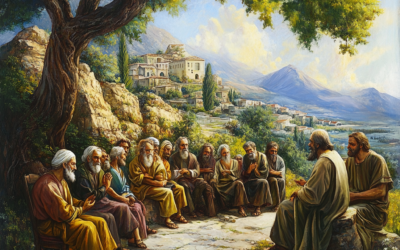“God is love.” Those three little words in 1 John 4:16 delivers a message that I believe we all need to take seriously. It doesn’t say God has love, like a stash of cosmic chocolate bars to hand out. No, God is love. That’s His essence and His identity. Everything about Him is steeped in this not so radical concept of all-encompassing love.
“We have come to know and have believed the love which God has for us. God is love, and the one who remains in love remains in God, and God remains in him.”
1 John 4:16 (NASB)
Although the basic principle of love is the same, this language, like many others in the Bible that are not very long, has many diverse meanings for many Christian organizations. This is a small statement, but it contains a lot of meaning and provides other biblical passages a great deal of depth.
Potential Context of This Particular Chapter on Love
This verse sits in a larger section of 1 John 4, where John is writing to an early Christian community grappling with their identity.
John wrote 1 John to a community of believers, probably focused on Ephesus, which was being threatened by false teachers. The numerous followers of Jesus were upset, perplexed, and divided as a result of these people’s denial of fundamental facts about Him, including His humanity and divinity. John’s audience is frequently referred to as “children,” which reflects their common spiritual link as well as his crucial pastoral care.
This letter was meant for wider distribution among early Christian communities rather than being targeted to a specific church or individual. Assuring believers of their salvation, confirming the veracity of Jesus Christ, and inspiring them to act out their faith via love, obedience, and rejection of erroneous ideas were John’s main objectives. For Christians today, its message is still a call to truth and loyalty.
Where can I find this possible background information?
- The actual New Testament
- The audience is referred to as “children” in several passages in 1 John (e.g., 1 John 2:1, 2:12-14), which also address topics such as heretical ideas and false instructors, namely the denial that Jesus was physically there (1 John 4:2-3).
- The early history of the Church
- Gnosticism and other heresies that rejected Jesus’ humanity and divinity were addressed by John, according to early Christian writers like Irenaeus and Eusebius.
- Scholarly works and commentary
- Sources such as William Barclay’s comments and Gordon D. Fee’s New Testament Exegesis offer historical and cultural perspectives on the probable audience and intent of 1 John.
- Theological consensus in general
- The epistle is interpreted as a pastoral letter that addressed internal conflict brought on by conflicting doctrines and served as guidance for several early Christian groups.
Being a group of rule-followers or theological debaters is insufficient for these believers. According to John, love is the foundation of their religion and their evidence of God’s existence. Love as a way of life, not just a sentiment.
This type of love isn’t the “I like your Instagram post” or “chocolates on Valentine’s Day” kind. John is discussing agape love, which is selfless, patient, selfless, and unrelentingly forgiving. A love that is more about showing up when it’s dirty and inconvenient than it is about giving warm fuzzies.
“God is Love”
1. It’s Not a Metaphor
John is not experimenting with poetry when he writes, “God is love.” It’s a strong theological assertion. Ho theos agapē estin, which translates to “God is love,” is the phrase in its original Greek. The predicate, love, and the subject, God, are interwoven.
This implies that God’s deeds are love in action rather than merely loving. Creation? A galaxy love ballad. Salvation? Love breaks the bonds. Judgement? Even that is justice sought by love. Love is echoed in every exquisite scream, whisper, and quiet.
2. Love: The Divine’s Mirror
The statement “The one who remains in love remains in God, and God remains in him” takes one step further in this verse. We reflect God in the same way that a mirror reflects sunlight when we decide to love—really love. We don’t summon this love by ourselves. No, it’s a divine boomerang: we catch God’s love and release it into the world. We stay bound to Him by doing this.
Theological Implications
1. God’s Character
The qualities of God—holiness, omnipotence, omniscience, and justice—are frequently emphasized in Christian theology. However, John maintains that the defining factor is love. “God loves each of us as if there were only one of us to love,” as the Church’s old wordsmith Augustine so eloquently put it. Love is not merely a feature of God; it is who He is.
2. Love Trinitarian
What does it look like within God if He is love? The Father, the Son, and the Holy Spirit are the Trinity. The members of the Trinity have been in a perfect partnership of selfless love for all eternity. The love between the Father and the Son is carried by the Spirit. The Father loves the Son. That love overflows into the universe through creation itself.
3. Love as Proof of Faith
John’s point is clear: You can’t claim to know God and be a jerk. Period. In verses leading up to 4:16, he says:
“The one who does not love does not know God, because God is love.”
1 John 4:8 (NASB)
Love is the receipt of your relationship with Him. No love? No proof of purchase.
Different Takes on Love
Roman Catholic Perspective:
This idea of love is frequently associated by the Catholic Church with caritas, or charity, which is the ultimate kind of love that pursues the welfare of others for its own purpose. It is believed to be a mirror of the grace that God has bestowed onto humanity, allowing us to love as He does.
Protestant Viewpoint:
Love is emphasized by Protestants, especially evangelicals, as proof of regeneration. Love will be the fruit that organically blossoms in your life if the gospel has changed you.
Eastern Orthodox Knowledge:
According to the Orthodox Church, theosis, or becoming like God, aims to achieve love. Humans become part of the divine nature through love, which returns God’s image to the earth.
Practical Implications
1. In Connections
You are displaying the heart of God when you demonstrate love to your spouse, your neighbor, or your child when they are having a fit at Target. It’s because God’s love is at work through you, not because you’re very good at it.
2. During a Conflict
Do you love someone who has harmed you? That stuff is on a supernatural level. Jesus tells you to love your adversaries, not merely to put up with them. Why? Because God provides us with that every day.
“But I say to you, love your enemies and pray for those who persecute you.”
Matthew 5:44 (NASB)
3. In Worship
Loving God isn’t just about warm feelings during Sunday service. It’s about aligning your life with His will and letting His love flow through you.
Wrapping It Up
Every time you fall in love, you’re participating in something timeless. You’re showcasing a small portion of God’s personality to the world. You serve as a mirror, bringing divine love to a world in dire need.
Keep this in mind the next time you choose not to retaliate, extend grace when it’s not due, or support someone even if it costs you something: God is love, and you are reflecting Him at that exact moment.
Scripture quotations taken from the (NASB®) New American Standard Bible®, Copyright ©, 2020 by The Lockman Foundation. Used by permission. All rights reserved. lockman.org









0 Comments